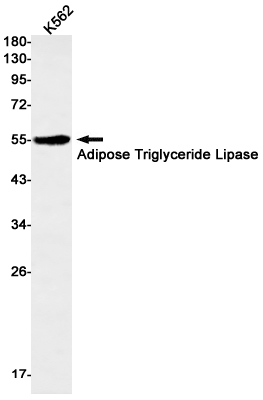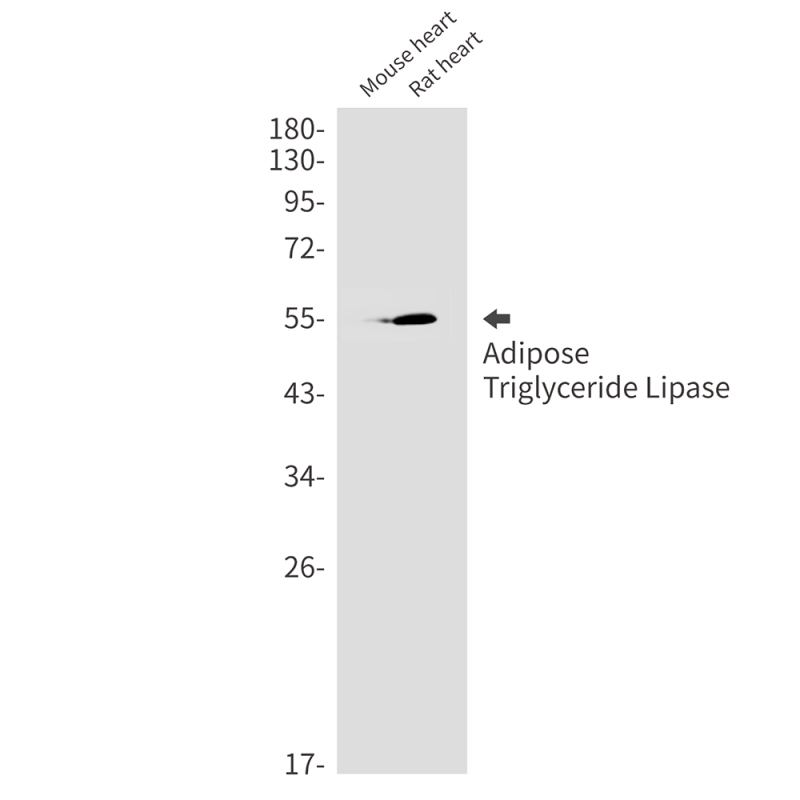

| WB | 咨询技术 | Human,Mouse,Rat |
| IF | 咨询技术 | Human,Mouse,Rat |
| IHC | 咨询技术 | Human,Mouse,Rat |
| ICC | 技术咨询 | Human,Mouse,Rat |
| FCM | 咨询技术 | Human,Mouse,Rat |
| Elisa | 咨询技术 | Human,Mouse,Rat |
| Aliases | ATGL; Desnutrin; plpl; plpl2; Pnpla2; TTS 2.2; TTS2; TTS2.2; ZETA |
| Entrez GeneID | 57104 |
| WB Predicted band size | Calculated MW: 55 kDa; Observed MW: 55 kDa |
| Host/Isotype | Rabbit IgG |
| Antibody Type | Primary antibody |
| Storage | Store at 4°C short term. Aliquot and store at -20°C long term. Avoid freeze/thaw cycles. |
| Species Reactivity | Human,Mouse,Rat |
| Immunogen | A synthetic peptide of human Adipose Triglyceride Lipase |
| Formulation | Purified antibody in TBS with 0.05% sodium azide,0.05%BSA and 50% glycerol. |
+ +
1. **"Fat mobilization in adipose tissue is promoted by adipose triglyceride lipase"**
*Authors: Zimmermann R., et al. (2004)*
摘要:该研究首次描述了ATGL在脂肪组织甘油三酯水解中的关键作用,并开发了针对ATGL的特异性抗体,验证其在哺乳动物脂肪细胞中的表达及功能。
2. **"Adipose triglyceride lipase regulates lipid metabolism in adipose and non-adipose tissues"**
*Authors: Haemmerle G., et al. (2006)*
摘要:通过ATGL基因敲除小鼠模型,研究证明ATGL抗体在检测脂质代谢相关组织(如心脏、肝脏)中的蛋白表达具有特异性,并揭示了其在全身脂质稳态中的作用。
3. **"Antibody-based characterization of adipose triglyceride lipase in human tissues"**
*Authors: Langin D., et al. (2005)*
摘要:利用多克隆ATGL抗体,系统分析了人类脂肪组织、骨骼肌等样本中ATGL的分布及表达水平,验证抗体在免疫印迹(Western blot)和免疫组化中的适用性。
4. **"Validation of commercial antibodies for adipose triglyceride lipase (ATGL/Pnpla2) detection"**
*Authors: Grahn T.H.M., et al. (2013)*
摘要:评估多种市售ATGL抗体的灵敏度和特异性,比较其在免疫荧光、流式细胞术中的应用效果,为实验选择合适抗体提供参考依据。
Adipose Triglyceride Lipase (ATGL), also known as patatin-like phospholipase domain-containing protein 2 (PNPLA2), is a key enzyme in lipid metabolism that catalyzes the hydrolysis of triglycerides into diglycerides and free fatty acids. As the rate-limiting enzyme in lipolysis, ATGL plays a critical role in energy homeostasis, making it a focus of research in metabolic disorders such as obesity, diabetes, and cardiovascular diseases. Antibodies targeting ATGL are essential tools for detecting and quantifying its expression in tissues, cells, or biological samples. These antibodies are widely used in techniques like Western blotting, immunohistochemistry (IHC), and immunofluorescence (IF) to study ATGL's localization, regulation, and interaction with coactivators (e.g., CGI-58) or inhibitors (e.g., G0S2).
ATGL antibodies are typically raised against specific epitopes of the human or murine protein, with cross-reactivity validated in common model organisms. High-quality antibodies exhibit specificity confirmed by knockout controls or siRNA-mediated silencing. Researchers employ these reagents to investigate ATGL's role in adipose tissue remodeling, intracellular lipid droplet dynamics, and pathological conditions like lipodystrophy or cancer-associated cachexia. Recent studies also explore ATGL's non-canonical functions, including its involvement in autophagy and inflammation. The development of phosphorylation-specific ATGL antibodies has further advanced understanding of post-translational regulation in response to hormonal signals (e.g., insulin, catecholamines).
×